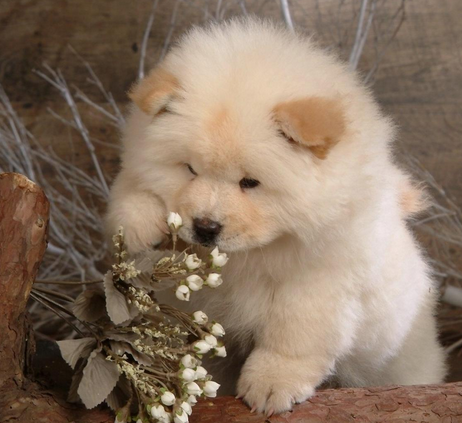Chows (aka Chow Chows)
Chows have a black tongue with a distinctive bluish tint. Normally, a blue tongued dog would be a cause for concern. However, when that blue tongue belongs to your Chow, it is completely normal.
The Chow originated in China, where it was used as a hunting dog. Asian sailors brought these dogs with them to England, where their exotic appearance quickly made them popular.

This breed is classified by the American Kennel Club as a member of the Non-Sporting group. The Chow is a 45 to 70 pound dog that stands 17 to 20 inches high. Its down turned lips can give this breed a deceptively angry appearance. This unfriendly impression is offset by the tail curling over the dog’s back and its thick double coat. The red Chow is most common, but these furry dogs also can have black, blue, cinnamon, or cream colored coats.
Chows are not high energy dogs, but they do need a bit more exercise than an apartment provides. A small fenced yard is adequate for this breed. If you do live in an apartment, be prepared to take your Chow for a daily run. However, do not allow him to run loose in the park, as Chows are prone to aggressiveness toward other dogs.
While Chows are devoted to their families and usually love children, they do not often do well with other pets. New owners should concentrate on socializing their puppies to be sure they do not grow up to be dangerous or aggressive to strangers. Puppy obedience classes are a good way to socialize your puppy while being sure it receives thorough obedience training.
Besides their tendency to be aloof and unfriendly to people outside the family, these dogs do have a few other drawbacks. They have a tendency to dominate people if they can get away with it and they can bully inexperienced dog owners. You will have to be firm with your dog and should always be sure to follow through on commands.
Since they are not extremely active dogs, Chows do not eat a lot. You should feed your dog a nutritious puppy food while he is young and a good adult dog food when he grows older. While they are easy to feed, they do require quite a lot of grooming. Their thick coats are hard to brush because they are so dense.
While they are big dogs, Chows should not spend too much time outside during the summer, since their thick coats do not protect Chows from heat sensitivity. These dogs also can suffer from hip dysplasia and often have problems with their knee joints.
If you don’t mind that Chows have a bit of an attitude problem when they are dealing with strangers or other animals, then this might just be the right breed for you. After all, there is nothing quite like hugging one of these fuzzy, bear like dogs anytime.
For more info, go to Wikipedia >>
[xyz-ihs snippet=”Signoff1″]
